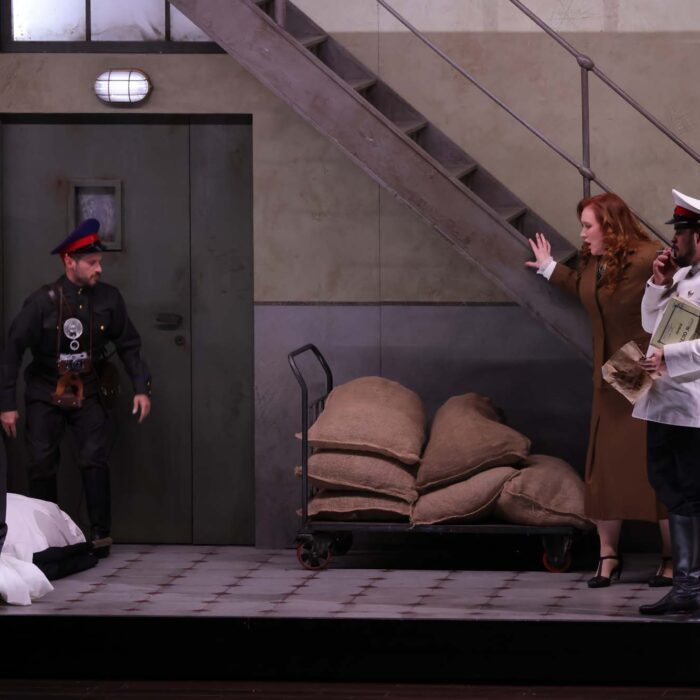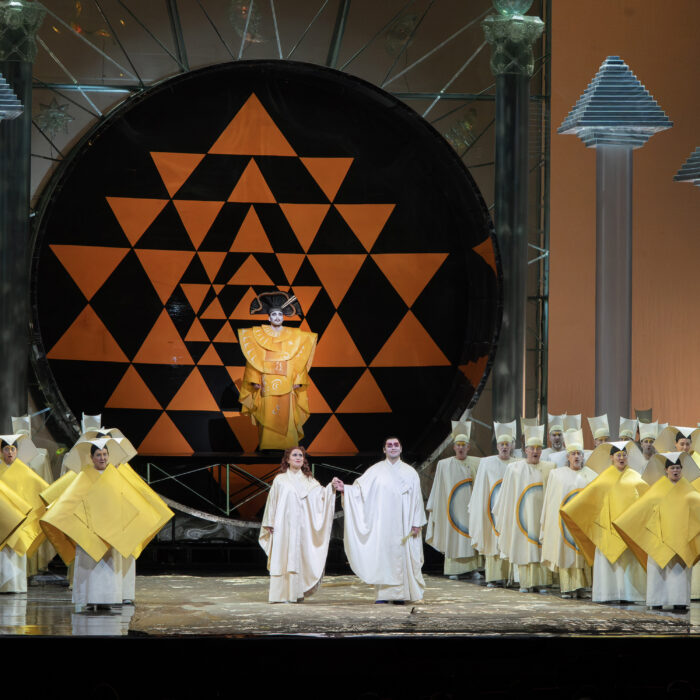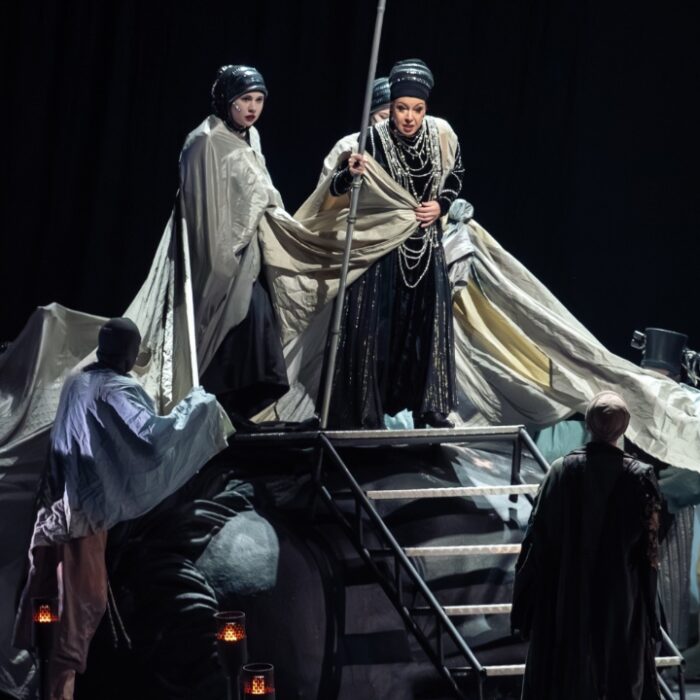
Northern Ireland Opera 2024 Review: Eugene Onégin
Cameron Menzies Leaves Tatyana Full of Regret
By Alan Neilson(Photo: Neil Harrison)
Since Cameron Menzies took on the position of artistic director of Northern Ireland Opera in 2020, the company has undergone something of a Renaissance. Although working on a slim budget, enough to fund only one main stage production each season, its imaginative and innovative approach has led to it staging a stream of high-quality short works, which the company has performed across the province in smaller venues, including theaters, country houses and even a gaol. This season’s main production, “Eugene Onégin”, proved to be further evidence of the company’s resurgence and strengthens its case for further funding to expand the number of its main stage productions.
All the company’s works are directed by Menzies himself and bare the stamp of his fertile imagination and finely tuned sense of drama, stagecraft and aesthetics–characteristics which he brought to his presentation of “Eugene Onégin”.
Tatyana Looks Back on Her Life With Regrets
During the overture, an old lady with a balloon looks across a large open space in which a party has just finished. It is not a sumptuous palace but a low-grade institutional room with white strip lighting, such as found in a nursing home or maybe a hospital. The figure is Tatyana, who is reflecting on a time when she crossed paths with Eugene Onégin, the man she loved but, due to the power of convention, decided to reject. From the sidelines, the old Tatyana observes her ill-fated love for Onégin playing out. She wanders among the characters, sometimes happy, sometimes sad, often lost in her memories. In the final scene, Onégin begs the younger Tatyana to reciprocate his love, which she rejects, while her older self, arms outstretched towards him, hopes desperately for a different outcome.
Then again, it may have simply been an old lady romanticizing about a past encounter; either way, it was a scene that beautifully captured the regrets of old age.
Niall McKeever’s set designs amounted to little more than an empty shell created by the brick walls of the stage, occasionally augmented by one or two props when necessary. It was, however, very effective. Not only did it open up the space for the complex dance routines and large crowd scenes, but it also ensured that the audience was always aware that the drama was taking place in two places simultaneously: in the drab real world of the institution and in the mind of the old woman. Menzies’s decision to introduce cleaners onto the stage during the dances reinforced the impression that the ballroom scene was only taking place in her mind.
Color and spectacle were added through Gillian Lennox’s wonderful costume designs. Whereas for the main characters the clothing was as expected, with wide ballgowns for the ladies, and suits and bowties for the men, for the peasants, the clothing was very unusual and created quite a shock; during the dance scene, they wore colorful clothing and wooden masks of various sizes as one might expect to find in a tribal society. It made for a fabulous mis-en-scène and added a strong visual contrast to the staging.
Credit must also be given to the movement director, Jennifer Rooney, whose choreography of the dance scenes was excellent; they were imaginative, lively, visually gripping and caught the spirit of the music.
Limburg Overcomes Slow Start to Produce Excellent Musical Performance
The musical side of the production was overseen by Dominic Limburg, conducting the Orchestra of Northern Ireland Opera. Maybe it was first-night nerves, but it did not start too well. The overture sounded very disjointed. It lacked balance and the sumptuousness one would expect. It took about another ten minutes or so before the orchestra settled, but when it did, it turned in an excellent performance in which the score’s beautiful textures and engaging melodies were brought thrillingly to life. It was also a dramatically sensitive reading that worked in close tandem with the stage. The dance and choral scenes were exceptionally well-balanced, in which the Northern Ireland Opera Chorus was in fine voice.
Baritone Yuriy Yurchuk cut a suave and confident impression as Onégin. He characterized him as a gentleman with a strong sense of entitlement, his treatment of Tatyana in the first act was brutal, as he delivered his rejection with an air of cold indifference and a slight hint of sadistic delight. Certainly, his calculated flirting with Olga, which he knew would upset Lensky, fitted neatly into his portrayal. This was supported by his carefully crafted vocal rendition, which was lyrically refined, confident, beautifully controlled and, at times, emotionally distant, giving Onégin an aloof, egocentric quality, and regardless of fault, he would obviously never have apologized to Lensky.
The reversal of his feelings towards Tatyana in Act three was made all the more powerful by the indifference and emotional detachment he had displayed up to this point. In typical Romantic style, his emotions now exploded as he prostrated himself on the floor before Tatyana and begged that she accept his love. Possibly, it went a little too far; maybe the contrast was too much, but Yurchuk’s singing was excellent, as he furnished the voice with a passionate intensity that hitherto had been kept in check. It made for a stunning finale.
Soprano Mary McCabe acted out the part of Tatyana well; open, naïve and optimistic in the first part of the opera, she became more mature, confident and assertive, so that she was able to hold her own in her meeting with Onégin in Act three. Vocally, however, it was not a role that suited her; the voice does not possess the necessary weight to carry the emotional force when set against the tumult of emotions that surrounded her. Certainly, she has vocal clarity, beauty and agility and was able to bring delicacy and sensitivity to her singing, but in the more emotionally fraught scenes, her expressivity was compromised. Her rendition of the letter scene aria illustrated the problem perfectly, which was sung with beauty and delicacy and showed off her upper register to good effect. However, although she imbued her voice with the correct emotions, she never managed to capture their full depth, instead giving it a superficial gloss.
Lensky came across as a man at the mercy of his passions; the more his jealousy, rage and anger spiraled out of control, the more compelling tenor Norman Reinhardt’s rendition became. He seemed to grow in stature as he crossed swords, first with Olga and then with Onégin, as he infused the vocal line with his emotions as he pushed the voice assertively upwards, inflecting the line with well-placed dynamic emphases. It was a fine performance, in which his weakness was brilliantly revealed by his sad reflective farewell to Olga before the duel, in which Reinhardt’s characterization had Lensky appearing to feel sorry for himself. Less convincing, however, was his first act arioso, in which his confession of love to Olga was somewhat tepid.
Mezzo-soprano Sarah Richmond produced a nuanced and detailed portrait of Tatyana’s sister, Olga. Not only was it an accomplished vocal performance to which she brought beautiful contrasting colors and a high degree of expressivity, but she embedded herself within the character. Richmond’s Olga was not a passive figure; she actively encouraged Onégin as they danced, and her treatment of Lensky came across as cruel. Their confrontation in Act two not only allowed Reinhardt to display Lensky’s increasingly frustrated and angry state but also captured Olga’s forceful and egotistical character.
More Cast Highlights
Mezzo-soprano Carolyn Dobbin has a strong and lively stage presence, which she used creatively to bring attention to her character. Cast as Madam Larina, Tatyana and Olga’s mother, she flitted around the stage like a mother hen, always interested in keeping an eye on the two girls, which did not preclude spying on them. She supported her fine acting performance with a vibrant and expressive vocal portrait.
The old nursemaid, Filipevna, was given a strong, well-sung performance by mezzo-soprano Jenny Bourke, who brought depth and shape to what can be a fairly anonymous role.
Aaron O’Hare hammed it up to the full as Monsieur Triquet, the French fop, with an entertaining, amusing characterization that showed off his pleasing tenor voice.
Baritone Niall Anderson made a brief Act three appearance in the small role of Prince Gremin but made a strong impression. His aria, “To love all ages are obedient,” allowed him to show off his pleasing lyricism and the beautiful tonal quality of his lower register.
Baritones Matthew Jeffrey in the role of a company commander and Seamus Brady in the role of Zaretzky both put in solid performances.
Actress Anne Flanagan put in a convincing performance in the non-speaking role of Tatyana in old age, in which she successfully communicated her feelings about how she now wished that the decisions she made could have been different.
Overall, this was a splendid production. It worked on every level, and the audience loved it. Northern Ireland Opera is a great cultural resource, and the Arts Council for Northern Ireland would do well to increase its funding. One fully staged production per year is a serious waste of potential.



